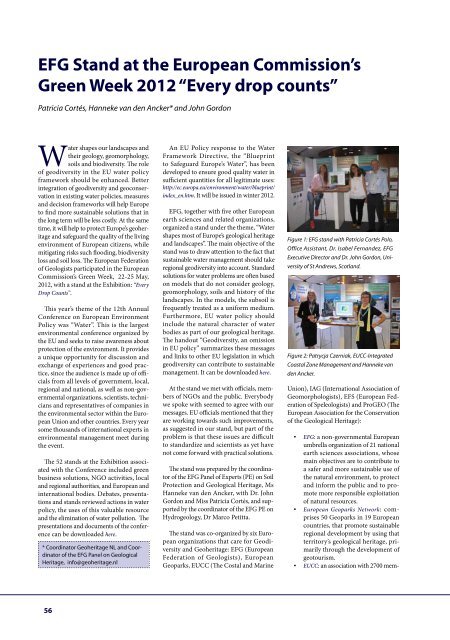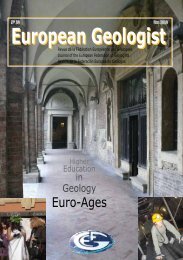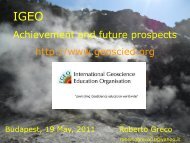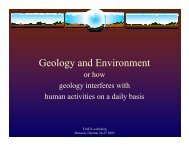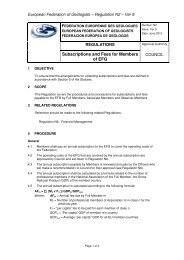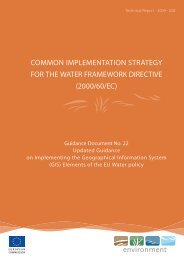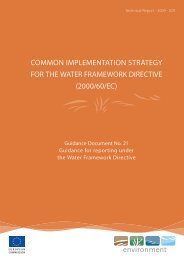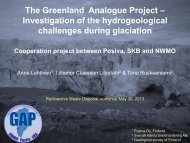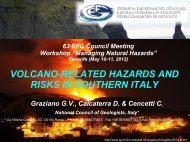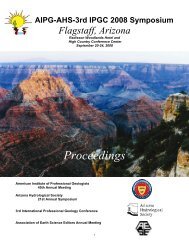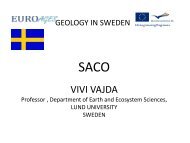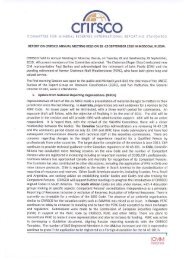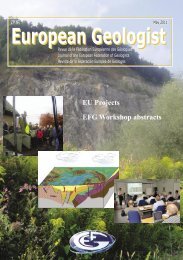European Geologist European Geologist Geoheritage - learning ...
European Geologist European Geologist Geoheritage - learning ...
European Geologist European Geologist Geoheritage - learning ...
Create successful ePaper yourself
Turn your PDF publications into a flip-book with our unique Google optimized e-Paper software.
EFG Stand at the <strong>European</strong> Commission’s<br />
Green Week 2012 “Every drop counts”<br />
Patricia Cortés, Hanneke van den Ancker* and John Gordon<br />
Water shapes our landscapes and<br />
their geology, geomorphology,<br />
soils and biodiversity. The role<br />
of geodiversity in the EU water policy<br />
framework should be enhanced. Better<br />
integration of geodiversity and geoconservation<br />
in existing water policies, measures<br />
and decision frameworks will help Europe<br />
to find more sustainable solutions that in<br />
the long term will be less costly. At the same<br />
time, it will help to protect Europe’s geoheritage<br />
and safeguard the quality of the living<br />
environment of <strong>European</strong> citizens, while<br />
mitigating risks such flooding, biodiversity<br />
loss and soil loss. The <strong>European</strong> Federation<br />
of <strong>Geologist</strong>s participated in the <strong>European</strong><br />
Commission’s Green Week, 22-25 May,<br />
2012, with a stand at the Exhibition: “Every<br />
Drop Counts”.<br />
This year’s theme of the 12th Annual<br />
Conference on <strong>European</strong> Environment<br />
Policy was “Water”. This is the largest<br />
environmental conference organized by<br />
the EU and seeks to raise awareness about<br />
protection of the environment. It provides<br />
a unique opportunity for discussion and<br />
exchange of experiences and good practice,<br />
since the audience is made up of officials<br />
from all levels of government, local,<br />
regional and national, as well as non-governmental<br />
organizations, scientists, technicians<br />
and representatives of companies in<br />
the environmental sector within the <strong>European</strong><br />
Union and other countries. Every year<br />
some thousands of international experts in<br />
environmental management meet during<br />
the event.<br />
The 52 stands at the Exhibition associated<br />
with the Conference included green<br />
business solutions, NGO activities, local<br />
and regional authorities, and <strong>European</strong> and<br />
international bodies. Debates, presentations<br />
and stands reviewed actions in water<br />
policy, the uses of this valuable resource<br />
and the elimination of water pollution. The<br />
presentations and documents of the conference<br />
can be downloaded here.<br />
* Coordinator <strong>Geoheritage</strong> NL and Coordinator<br />
of the EFG Panel on Geological<br />
Heritage, info@geoheritage.nl<br />
An EU Policy response to the Water<br />
Framework Directive, the “Blueprint<br />
to Safeguard Europe’s Water”, has been<br />
developed to ensure good quality water in<br />
sufficient quantities for all legitimate uses:<br />
http://ec.europa.eu/environment/water/blueprint/<br />
index_en.htm. It will be issued in winter 2012.<br />
EFG, together with five other <strong>European</strong><br />
earth sciences and related organizations,<br />
organized a stand under the theme, “Water<br />
shapes most of Europe’s geological heritage<br />
and landscapes”. The main objective of the<br />
stand was to draw attention to the fact that<br />
sustainable water management should take<br />
regional geodiversity into account. Standard<br />
solutions for water problems are often based<br />
on models that do not consider geology,<br />
geomorphology, soils and history of the<br />
landscapes. In the models, the subsoil is<br />
frequently treated as a uniform medium.<br />
Furthermore, EU water policy should<br />
include the natural character of water<br />
bodies as part of our geological heritage.<br />
The handout “Geodiversity, an omission<br />
in EU policy” summarizes these messages<br />
and links to other EU legislation in which<br />
geodiversity can contribute to sustainable<br />
management. It can be downloaded here.<br />
At the stand we met with officials, members<br />
of NGOs and the public. Everybody<br />
we spoke with seemed to agree with our<br />
messages. EU officials mentioned that they<br />
are working towards such improvements,<br />
as suggested in our stand, but part of the<br />
problem is that these issues are difficult<br />
to standardize and scientists as yet have<br />
not come forward with practical solutions.<br />
The stand was prepared by the coordinator<br />
of the EFG Panel of Experts (PE) on Soil<br />
Protection and Geological Heritage, Ms<br />
Hanneke van den Ancker, with Dr. John<br />
Gordon and Miss Patricia Cortés, and supported<br />
by the coordinator of the EFG PE on<br />
Hydrogeology, Dr Marco Petitta.<br />
The stand was co-organized by six <strong>European</strong><br />
organizations that care for Geodiversity<br />
and <strong>Geoheritage</strong>: EFG (<strong>European</strong><br />
Federation of <strong>Geologist</strong>s), <strong>European</strong><br />
Geoparks, EUCC (The Costal and Marine<br />
Figure 1: EFG stand with Patricia Cortés Polo,<br />
Office Assistant, Dr. Isabel Fernandez, EFG<br />
Executive Director and Dr. John Gordon, University<br />
of St Andrews, Scotland.<br />
Figure 2: Patrycja Czerniak, EUCC-Integrated<br />
Coastal Zone Management and Hanneke van<br />
den Ancker.<br />
Union), IAG (International Association of<br />
Geomorphologists), EFS (<strong>European</strong> Federation<br />
of Speleologists) and ProGEO (The<br />
<strong>European</strong> Association for the Conservation<br />
of the Geological Heritage):<br />
• EFG: a non-governmental <strong>European</strong><br />
umbrella organization of 21 national<br />
earth sciences associations, whose<br />
main objectives are to contribute to<br />
a safer and more sustainable use of<br />
the natural environment, to protect<br />
and inform the public and to promote<br />
more responsible exploitation<br />
of natural resources.<br />
• <strong>European</strong> Geoparks Network: comprises<br />
50 Geoparks in 19 <strong>European</strong><br />
countries, that promote sustainable<br />
regional development by using that<br />
territory’s geological heritage, primarily<br />
through the development of<br />
geotourism.<br />
• EUCC: an association with 2700 mem-<br />
56


